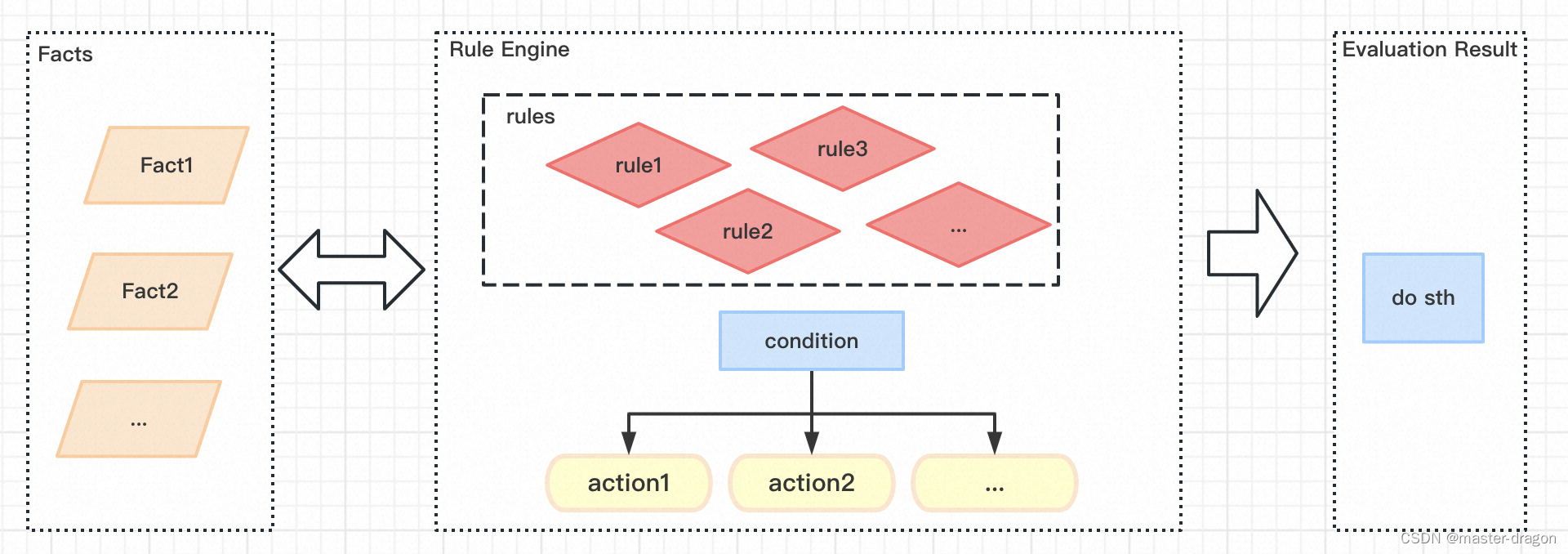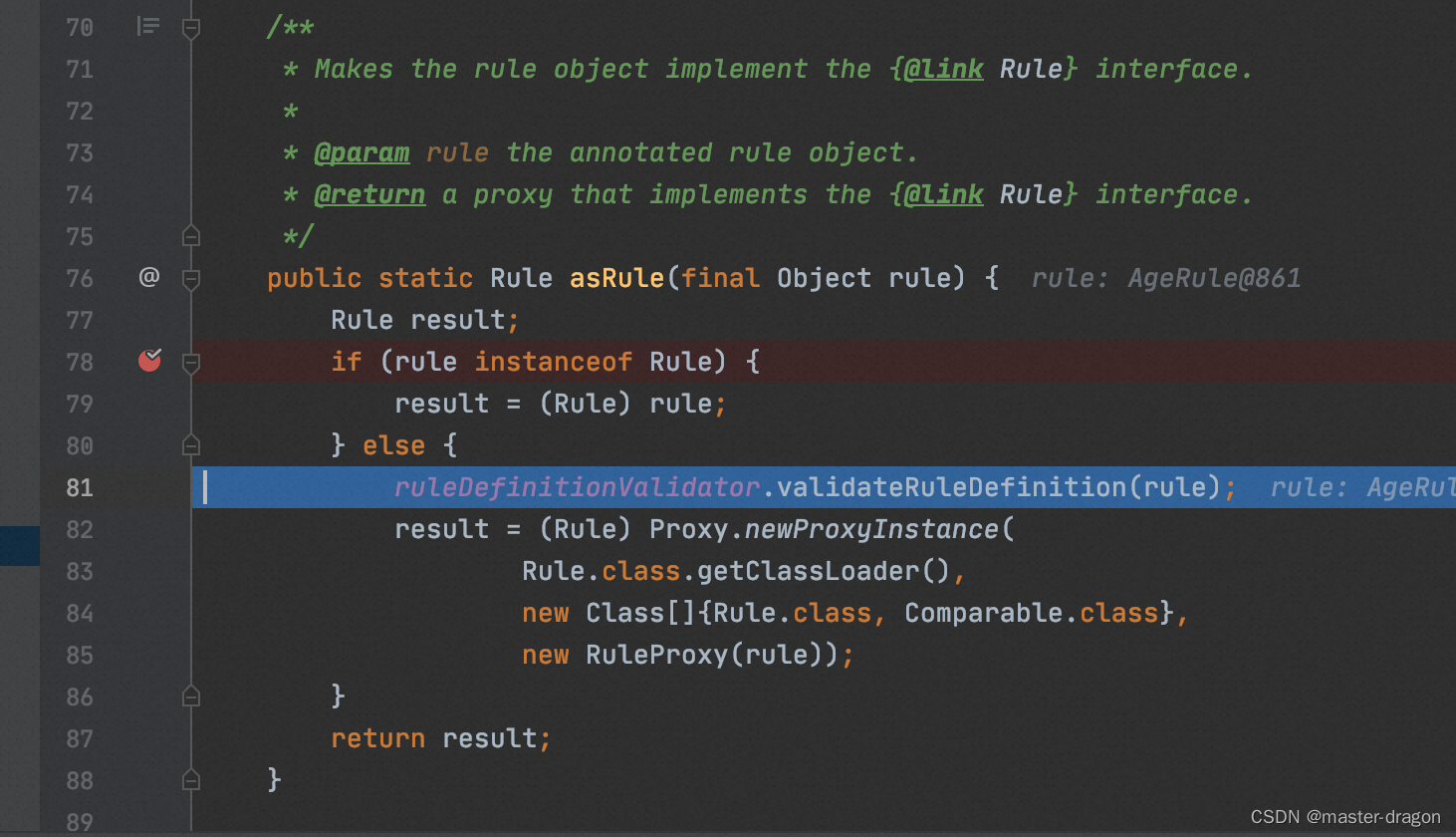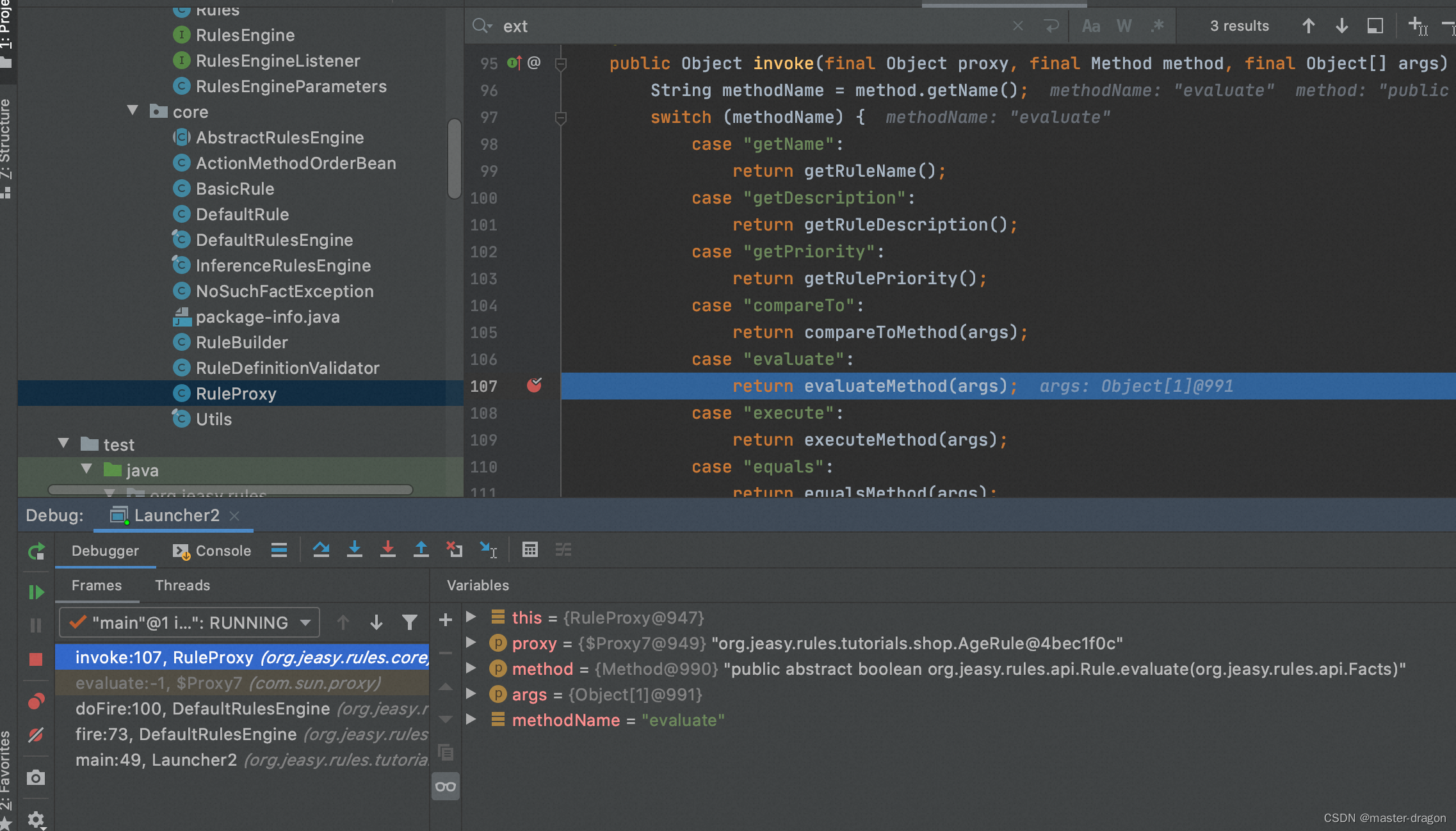目录
概念理解
描述一个简单的处理:基于一堆现实情况,运用规则引擎、经过处理得到对应的结果,然后再据此做后续的事情。
- fact: 事实,已有的现实情况,即输入信息
- rules: 规则集合,由一系列规则组成,可能有不同的规则排列
- rule: 规则,包含基本的判断条件和条件符合要做的动作。
- condition: 规则的判定条件(特定的判断逻辑 if else)
- action: 规则判定符合后执行的动作

实例和编码
一句话描述: 人提着包去酒店买酒,需要判断是否成年人,成年人才能购买酒,商店据此卖你酒,你买到了酒就装包里走人,回家喝酒去。
接下来看easy-rules的定义和处理。
抽象出2条规则
@Rule(name = "age-rule", description = "age-rule", priority = 1)
public class AgeRule {
@Condition
public boolean isAdult(@Fact("person") Person person) {
return person.getAge() > 18;
}
@Action
public void setAdult(@Fact("person") Person person) {
person.setAdult(true);
}
}
package org.jeasy.rules.tutorials.shop;
import org.jeasy.rules.annotation.Action;
import org.jeasy.rules.annotation.Condition;
import org.jeasy.rules.annotation.Fact;
import org.jeasy.rules.annotation.Rule;
/**
* @author dingqi on 2023/5/26
* @since 1.0.0
*/
@Rule(name = "alcohol-rule", description = "alcohol-rule", priority = 2)
public class AlcoholRule {
@Condition
public boolean shopRule(@Fact("person") Person person) {
return person.isAdult() == true;
}
@Action
public void shopReply(@Fact("bag") Bag bag) {
bag.setSuccess(true);
bag.add("Vodka");
}
}
简单的规则引擎
// create a rule set
Rules rules = new Rules();
rules.register(new AgeRule());
rules.register(new AlcoholRule());
//create a default rules engine and fire rules on known facts
DefaultRulesEngine rulesEngine = new DefaultRulesEngine();
事实1的处理
Facts facts = new Facts();
Person tom = new Person("Tom", 19);
facts.put("person", tom);
Bag bag = new Bag();
facts.put("bag", bag);
System.out.println("Tom: Hi! can I have some Vodka please?");
rulesEngine.fire(rules, facts);
System.out.println("Tom: bag is " + bag);
输出:Tom成年了,买到了伏特加
Tom: Hi! can I have some Vodka please?
Tom: bag is Bag{
success=true, goods=[Vodka]}
事实2的处理
Person jack = new Person("Jack", 10);
facts.put("person", jack);
Bag bag2 = new Bag();
facts.put("bag", bag2);
System.out.println("Jack: Hi! can I have some Vodka please?");
rulesEngine.fire(rules, facts);
System.out.println("Jack: bag is " + bag2);
输出:Jack未成年,无功而返
Jack: Hi! can I have some Vodka please?
Jack: bag is Bag{
success=false, goods=[]}
easy-rules 规则的抽象和执行
事实描述
public class Facts implements Iterable<Fact<?>> {
private final Set<Fact<?>> facts = new HashSet<>();
/**
* A class representing a named fact. Facts have unique names within a {@link Facts}
* instance.
*
* @param <T> type of the fact
* @author Mahmoud Ben Hassine
*/
public class Fact<T> {
private final String name;
private final T value;
事实简单就是key、value对, 某个事实的名称,和事实的属性特征(以一切皆对象来看,就是一个一个的对象组成了事实)。(只要在规则条件真正执行前,能明确这些事实就行)
规则的抽象
- 名称
- 描述
- 优先级
- 执行Facts的的方法
见org.jeasy.rules.api.Rule接口 和基础实现类org.jeasy.rules.core.BasicRule
条件和动作注解:
@Inherited
@Retention(RetentionPolicy.RUNTIME)
@Target(ElementType.METHOD)
public @interface Condition {
}
@Inherited
@Retention(RetentionPolicy.RUNTIME)
@Target(ElementType.METHOD)
public @interface Condition {
}
默认的规则
class DefaultRule extends BasicRule {
private final Condition condition;
private final List<Action> actions;
DefaultRule(String name, String description, int priority, Condition condition, List<Action> actions) {
super(name, description, priority);
this.condition = condition;
this.actions = actions;
}
@Override
public boolean evaluate(Facts facts) {
return condition.evaluate(facts);
}
@Override
public void execute(Facts facts) throws Exception {
for (Action action : actions) {
action.execute(facts);
}
}
}
动态代理执行规则和动作
使用org.jeasy.rules.api.Rules添加规则时如下:
扫描二维码关注公众号,回复:
15205065 查看本文章


- org.jeasy.rules.api.Rules#register
public void register(Object... rules) {
Objects.requireNonNull(rules);
for (Object rule : rules) {
Objects.requireNonNull(rule);
this.rules.add(RuleProxy.asRule(rule));
}
}
使用org.jeasy.rules.annotation.Rule注解构造的规则是使用RuleProxy构造的

规则的执行:org.jeasy.rules.core.DefaultRulesEngine#doFire
void doFire(Rules rules, Facts facts) {
if (rules.isEmpty()) {
LOGGER.warn("No rules registered! Nothing to apply");
return;
}
logEngineParameters();
log(rules);
log(facts);
LOGGER.debug("Rules evaluation started");
for (Rule rule : rules) {
final String name = rule.getName();
final int priority = rule.getPriority();
if (priority > parameters.getPriorityThreshold()) {
LOGGER.debug("Rule priority threshold ({}) exceeded at rule '{}' with priority={}, next rules will be skipped",
parameters.getPriorityThreshold(), name, priority);
break;
}
if (!shouldBeEvaluated(rule, facts)) {
LOGGER.debug("Rule '{}' has been skipped before being evaluated", name);
continue;
}
boolean evaluationResult = false;
try {
evaluationResult = rule.evaluate(facts);
} catch (RuntimeException exception) {
LOGGER.error("Rule '" + name + "' evaluated with error", exception);
triggerListenersOnEvaluationError(rule, facts, exception);
// give the option to either skip next rules on evaluation error or continue by considering the evaluation error as false
if (parameters.isSkipOnFirstNonTriggeredRule()) {
LOGGER.debug("Next rules will be skipped since parameter skipOnFirstNonTriggeredRule is set");
break;
}
}
if (evaluationResult) {
LOGGER.debug("Rule '{}' triggered", name);
triggerListenersAfterEvaluate(rule, facts, true);
try {
triggerListenersBeforeExecute(rule, facts);
rule.execute(facts);
LOGGER.debug("Rule '{}' performed successfully", name);
triggerListenersOnSuccess(rule, facts);
if (parameters.isSkipOnFirstAppliedRule()) {
LOGGER.debug("Next rules will be skipped since parameter skipOnFirstAppliedRule is set");
break;
}
} catch (Exception exception) {
LOGGER.error("Rule '" + name + "' performed with error", exception);
triggerListenersOnFailure(rule, exception, facts);
if (parameters.isSkipOnFirstFailedRule()) {
LOGGER.debug("Next rules will be skipped since parameter skipOnFirstFailedRule is set");
break;
}
}
} else {
LOGGER.debug("Rule '{}' has been evaluated to false, it has not been executed", name);
triggerListenersAfterEvaluate(rule, facts, false);
if (parameters.isSkipOnFirstNonTriggeredRule()) {
LOGGER.debug("Next rules will be skipped since parameter skipOnFirstNonTriggeredRule is set");
break;
}
}
}
}
默认的规则引擎直接遍历规则去执行,如果condition执行命中后,则去执行action
public class RuleProxy implements InvocationHandler

private Object evaluateMethod(final Object[] args) throws IllegalAccessException, InvocationTargetException {
Facts facts = (Facts) args[0];
Method conditionMethod = getConditionMethod();
try {
List<Object> actualParameters = getActualParameters(conditionMethod, facts);
return conditionMethod.invoke(target, actualParameters.toArray()); // validated upfront
} catch (NoSuchFactException e) {
LOGGER.warn("Rule '{}' has been evaluated to false due to a declared but missing fact '{}' in {}",
getTargetClass().getName(), e.getMissingFact(), facts);
return false;
} catch (IllegalArgumentException e) {
LOGGER.warn("Types of injected facts in method '{}' in rule '{}' do not match parameters types",
conditionMethod.getName(), getTargetClass().getName(), e);
return false;
}
}
规则执行监听器
在规则执行的过程中,可以做各种操作。可以看成规则的扩展点
/**
* A listener for rule execution events.
*
* @author Mahmoud Ben Hassine ([email protected])
*/
public interface RuleListener {
/**
* Triggered before the evaluation of a rule.
*
* @param rule being evaluated
* @param facts known before evaluating the rule
* @return true if the rule should be evaluated, false otherwise
*/
default boolean beforeEvaluate(Rule rule, Facts facts) {
return true;
}
/**
* Triggered after the evaluation of a rule.
*
* @param rule that has been evaluated
* @param facts known after evaluating the rule
* @param evaluationResult true if the rule evaluated to true, false otherwise
*/
default void afterEvaluate(Rule rule, Facts facts, boolean evaluationResult) {
}
/**
* Triggered on condition evaluation error due to any runtime exception.
*
* @param rule that has been evaluated
* @param facts known while evaluating the rule
* @param exception that happened while attempting to evaluate the condition.
*/
default void onEvaluationError(Rule rule, Facts facts, Exception exception) {
}
/**
* Triggered before the execution of a rule.
*
* @param rule the current rule
* @param facts known facts before executing the rule
*/
default void beforeExecute(Rule rule, Facts facts) {
}
/**
* Triggered after a rule has been executed successfully.
*
* @param rule the current rule
* @param facts known facts after executing the rule
*/
default void onSuccess(Rule rule, Facts facts) {
}
/**
* Triggered after a rule has failed.
*
* @param rule the current rule
* @param facts known facts after executing the rule
* @param exception the exception thrown when attempting to execute the rule
*/
default void onFailure(Rule rule, Facts facts, Exception exception) {
}
}
回顾规则执行和监听器的执行过程
// 1. 条件执行前
triggerListenersBeforeEvaluate(rule, facts);
try {
evaluationResult = rule.evaluate(facts);
} catch(Exception e){
// 2. 条件执行失败
triggerListenersOnEvaluationError(rule, facts, exception);
}
if (evaluationResult) {
// 3. 条件执行后(条件满足)
triggerListenersAfterEvaluate(rule, facts, true);
try {
// 4. 动作执行前
triggerListenersBeforeExecute(rule, facts);
rule.execute(facts);
// 5. 动作执行后
triggerListenersOnSuccess(rule, facts);
} catch (Exception exception) {
// 6. 条件执行失败
triggerListenersOnFailure(rule, exception, facts);
}
}else{
// 3. 条件执行后(条件不满足)
triggerListenersAfterEvaluate(rule, facts, false);
}
扩展
- Java Expression Language (JEXL) :表达式语言引擎
https://commons.apache.org/proper/commons-jexl/apidocs/org/apache/commons/jexl3/JexlEngine.html
name: adult rule
description: when age is greater than 18, then mark as adult
priority: 1
condition: "#{ ['person'].age > 18 }"
actions:
- "#{ ['person'].setAdult(true) }"